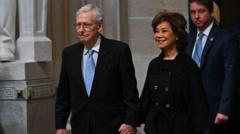European leadership is grappling with the implications of the U.S. administration's approach to the ongoing conflict in Ukraine, amidst discussions on military spending and the future of Ukraine's sovereignty.
Europe's Leadership Navigates Ukraine's Future amidst U.S. Policy Shift

Europe's Leadership Navigates Ukraine's Future amidst U.S. Policy Shift
European leaders convene in Paris to strategize over Ukraine as U.S. shifts approach with Russia.
In a key gathering in Paris, European leaders, including French President Emmanuel Macron and German Chancellor Olaf Scholz, convened yesterday to strategize a collective response to the ongoing war in Ukraine. This meeting comes as the Trump administration gears up to engage in its own discussions with Russia regarding the potential end of the conflict.
A prevailing uncertainty looms over what a resolution might entail. Ukraine, grappling with Russia's substantial advances, faces daunting decisions regarding potential territorial concessions. Simultaneously, Russia is reportedly incurring heavy casualties—approximately 1,000 daily—while also experiencing severe economic distress. A cessation of hostilities could potentially lead to a reduction in Western sanctions against Russia, fostering a complex landscape for negotiation.
In parallel, Ukrainian President Volodymyr Zelensky recently visited the United Arab Emirates, focusing his discussions on sensitive topics including prisoner exchanges and the welfare of displaced Ukrainian children.
This diplomatic backdrop contrasts sharply with developments within U.S. politics, where recent actions taken by President Trump have raised eyebrows. Four senior aides to New York City Mayor Eric Adams announced their resignations following a controversial move by the Justice Department to dismiss corruption charges against him. This situation underscores an increasingly turbulent political landscape, as critics assert that the Trump administration is prioritizing personal interests and engaging in an unprecedented act of vindictiveness during its tenure.
In other regional developments, ongoing tensions in the Middle East have seen Palestinian residents evacuating their homes amid Israeli military operations in the occupied West Bank, highlighting the broader geopolitical instability affecting multiple regions in the world.
As these events unfold, the implications for global security and international relations remain profound, with Europe's strategic positioning on the Ukraine conflict becoming increasingly vital amidst the shifting U.S. policy landscape.
A prevailing uncertainty looms over what a resolution might entail. Ukraine, grappling with Russia's substantial advances, faces daunting decisions regarding potential territorial concessions. Simultaneously, Russia is reportedly incurring heavy casualties—approximately 1,000 daily—while also experiencing severe economic distress. A cessation of hostilities could potentially lead to a reduction in Western sanctions against Russia, fostering a complex landscape for negotiation.
In parallel, Ukrainian President Volodymyr Zelensky recently visited the United Arab Emirates, focusing his discussions on sensitive topics including prisoner exchanges and the welfare of displaced Ukrainian children.
This diplomatic backdrop contrasts sharply with developments within U.S. politics, where recent actions taken by President Trump have raised eyebrows. Four senior aides to New York City Mayor Eric Adams announced their resignations following a controversial move by the Justice Department to dismiss corruption charges against him. This situation underscores an increasingly turbulent political landscape, as critics assert that the Trump administration is prioritizing personal interests and engaging in an unprecedented act of vindictiveness during its tenure.
In other regional developments, ongoing tensions in the Middle East have seen Palestinian residents evacuating their homes amid Israeli military operations in the occupied West Bank, highlighting the broader geopolitical instability affecting multiple regions in the world.
As these events unfold, the implications for global security and international relations remain profound, with Europe's strategic positioning on the Ukraine conflict becoming increasingly vital amidst the shifting U.S. policy landscape.























